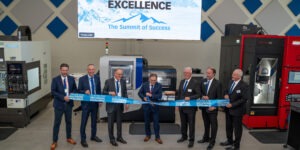LESS IS MORE
The Economics of Outsourced Machine Tool Maintenance: Service contracts are becoming increasingly prevalent as manufacturers outsource equipment maintenance and repair to reliable third-party service providers.
Posted: January 5, 2009
Just as maintenance outsourcing is taking hold in U.S. aerospace and among major U.S. airlines, more manufacturers are concluding their forte is operating machine tools for maximum return, not maintaining and repairing them.
Any moderately-sized manufacturing operation requires extensive and expensive man-hours to keep production floor machines humming with minimal downtime, leading managers to look for a better approach to resource utilization.
This situation describes HydraForce, Inc. (Lincolnshire, IL) a manufacturer of hydraulic cartridge valves, electro-hydraulic controls and custom-integrated circuit manifolds for snowplows, bobcat tractors, bulldozers, road pavers and transmissions. Its maintenance decision was primarily quality-driven, rather than cost-driven.
With growth near 30 percent CAGR (compound annual growth rate), the company's small maintenance staff was stretched across multiple expanding facilities, with an increasing number of machines performing a multitude of functions. Unwilling to compromise its stringent quality standards and tolerances in the millionths of an inch, the company turned to Sunnen Products (St. Louis, MO), its primary machine tool manufacturer-supplier.
"Once we made the decision to add a PM (preventive maintenance) program," explains Chris O'Bryan, HydraForce maintenance director, "it allowed us to focus on everything else in our facilities needing attention. There was no question the machine tool supplier could deliver, because they're the ones who built our twenty-eight honing machines."
Looking back over the five years since outsourcing its maintenance, HydraForce is satisfied with the results. It stocks fewer parts due to efficient supplier responsiveness and, when a repair part is required, it pays less for it. "Our downtime has been cut by 33 percent," reports O'Bryan, "but our machines rarely go down anymore because with five thorough service visits a year, most problems are detected and fixed before a part even fails."
Those outcomes mirror the expectations of Sun Hydraulics (Sarasota, FL), which manufactures high performance hydraulic cartridge valves and manifolds used in lifts, ladders, motors and payload equipment for tractors. Sun was challenged with scaling up production based upon strong year-over-year sales. Its managers wanted resources focused on production, especially given its demanding quality and tolerance requirements, honing hydraulic valve surfaces to the millionths of an inch.
According to Mike Smith, Honing Team Lead, Sun managers asked themselves two fundamental questions: "What business are we in, and what do our customers come here to buy?" The company fully understood their customers' only interest was in quality products at cost-competitive price levels, not machine maintenance. The decision to add a twelfth Sunnen honing machine to production presented Sun with the perfect opportunity to re-think its entire service, repair and spare part inventory process. "That evaluation led to a breakthrough decision to implement a service contract to give us the cost-savings we wanted across labor and inventory, as well the equipment utilization needed on our two shifts," said Smith.
The company witnessed a "broad-based payout" in the first year. "We're looking at part and service savings between 8-11 percent, while our average machine downtime has been reduced as much as 12 percent," states Smith. "In terms of improved throughput, I'd say it's easily in excess of 15 percent in volume – and that's without additional labor."
ALL ABOUT THE MATH
Manufacturers take a straightforward, business-case approach to significant decisions like outsourcing an important support function, whether it is I/T or machine maintenance. Once the supplier's service reputation and reliability are established, the clincher becomes the impact to the bottom line in terms of improved competitive advantage and financial results.
"Service contracts can result in significant savings for machine tool owners, accruing basically from three different areas," according to Wes McCullough, Sunnen Field Service Manager. He cites:
? Reduced direct labor costs, now borne by the service/support provider. These savings easily add up to thousands of dollars annually.
? Discounted parts and service offered as an integral part of a provider's bundled pricing.
? The service specialist's machine expertise, which leads to repair and maintenance completion in less time than by a staff mechanic or electrician. With repairs completed faster, or avoided altogether through proactive maintenance, average machine downtime is reduced and throughput is increased.
START ASKING QUESTIONS
When approached to develop a maintenance plan, Sunnen avoids off-the-shelf templates dictating service call frequency, number of replacement parts or gallons of coolant. Instead it uses a consultative, shop-floor approach, observing production and part-making methods down to the individual operator's habits. It benchmarks equipment expectations, common operator complaints, all to project repair frequencies and appropriate service levels. Such observation and evaluation typically require several hours per machine.
"We evaluate their whole process, including each machine and the parts being made, so we can see the processes and parts causing the most stress," explains McCullough. "Compare two identical machines making different parts, one may get 3,000 hours out of the spindle before there is a bearing problem and another may run 5,000 hours. All the individual situations have to be considered in formulating the proper level of maintenance.?
The result that often surprises managers is the reduced amount of time required to keep everything up and running. "The customer expects it will take us at least as much time as it took them, but it's really much less," McCullough says. "Our edge is we start out knowing the machines better and that gives us a real time-advantage."
While a service contract can have definite customer advantages, it also benefits the machine tool manufacturer. Working side-by-side with the customer on the factory floor allows the machine tool manufacturer to develop a more effective working relationship with them.
"We see first-hand how they use their machines and what their expectations are, so we are in a much better position to support them, day in-day out," reports McCullough. Perhaps as a result of a closer working relationship, manufacturers planning future production changes often will consult with the service provider, seeking its advice and guidance on machine upgrades, replacements and relocations.
A BOOST TO ISO CERTIFICATION
As is the case with both Sun Hydraulics and HydraForce, manufacturers are making service agreements an integral part of their ISO certification process. Quality departments naturally take a keen interest in the provider's service protocols, monitoring closely the impact on quality, machine productivity and scrap rates. Also providing an extra boost to ISO certification is the inclusion in the company's ISO documentation of the provider's service standards and procedures, maintenance schedules and after-service reports.
"This has had a very positive impact on our ISO certification," adds HydraForce's Chris O'Bryan. "When ISO auditors are on-site asking pointed questions and scrutinizing our daily operator's charts, everything is very well documented, including machine downtime, major repairs and part replacement."
In the final analysis, one advantage stands out.
"All the important metrics, reporting and ISO audits aside, what really matters," McCullough suggests, "is the quick, effective response by the service specialist when a machine goes down. Whether responding by phone or in person, recreating a problem on a machine or in a remote lab, invariably the service specialist facilitates faster, more informed decision-making and problem resolution than would have been possible with in-house maintenance technicians."
– – – – – – – – – – – – – – – – – – – – – – – – – – – – – – – – – – – – – – – – –
HydraForce, Inc., 500 Barclay Boulevard, Lincolnshire, IL 60069, 847-793-2300, Fax: 847-793-0086, www.hydraforce.com.
Sun Hydraulics Corporation, 1500 West University Parkway, Sarasota, FL 34243, 941-362-1200, Fax: 941-355-4497, www.sunhydraulics.com.
Sunnen Products, 7910 Manchester Road, St. Louis, MO 63143, 314-781-2100, Fax: 314-781-2268, www.sunnen.com.














